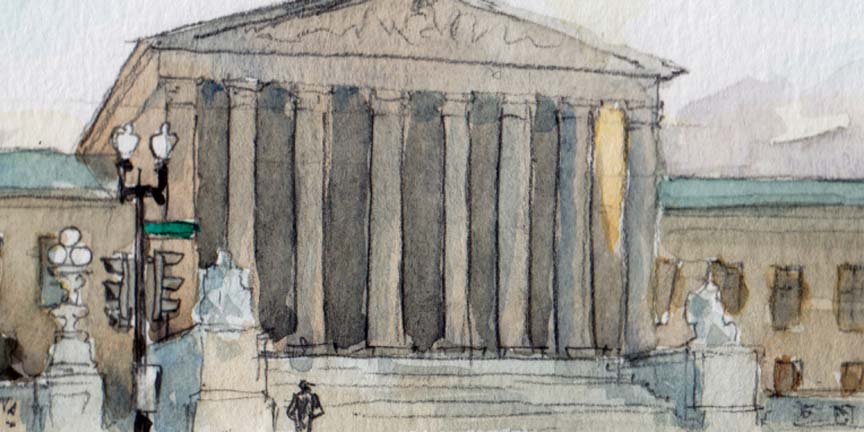Wednesday round-up

on Aug 8, 2018 at 7:05 am

The nomination of Judge Brett Kavanaugh to the Supreme Court is keeping senators occupied even during their truncated August recess. At The Hill, Jordain Carney reports that “Sen. Dianne Feinstein (D-Calif.) is doubling down on her demand for the National Archives to hand over documents tied to … Kavanaugh’s tenure in the George W. Bush White House.” In an op-ed for The Wall Street Journal, Senate Judiciary Committee Chairman Chuck Grassley maintains that the documents from Kavanaugh’s tenure as White House staff secretary, requested by Senate Democrats, “are both the least relevant documents to the nomination and the most sensitive to the executive branch, two considerations that have guided previous review processes.”
Maryalice Parks reports for ABC News that “[a]mong professional strategists and volunteer activists, especially those to the left in the Democratic Party, there is a growing frustration that Democratic Senate leaders are not thinking outside the box and doing enough to keep [Kavanaugh] from being confirmed.” At The Hill, Jordain Carney reports that “GOP Sens. Lisa Murkowski (Alaska) and Susan Collins (Maine), seen as potential swing votes on President Trump’s Supreme Court nominee, are facing intense pressure from activists during their August recess.” For The Washington Times, David Sherfinski reports that “[t]he National Rifle Association’s legislative-lobbying arm announced Tuesday a seven-figure national and region ad campaign to support [Kavanaugh’s] confirmation.”
At NPR, Nina Totenberg examines Kavanaugh’s views about “the ‘Unitary Executive,’” a phrase that “boils down to the idea that the president should be able to, for any reason, fire the heads of various departments that have executive powers.” For The Washington Post, Ann Marimow reports that “even as Kavanaugh has taken steps to open up an elite, historically white and male network, civil rights advocates cite legal opinions, interviews and writings that suggest he would weaken broad legal protections for minorities,” and that “[i]nterest groups on both sides say Kavanaugh could be the vote conservatives have been looking for to speed up the demise of affirmative action in college admissions.” For this blog, Timothy Zick looks at Kavanaugh’s record in cases involving freedom of expression.
At CNN, Manu Raju reports that “Kavanaugh in 2013 asserted that it’s a ‘traditional exercise’ of presidential power to ignore laws the White House views as unconstitutional, as he defended the controversial practice of signing statements prevalent in George W. Bush’s White House.” At Politico, Elana Schor reports that “Senate Democrats are gearing up to press Supreme Court nominee Brett Kavanaugh on his decades-long relationship with former Judge Alex Kozinski, who was forced into retirement last year by a mounting sexual harassment scandal.”
For USA Today, Richard Wolf reports that Kavanaugh made an exception yesterday to the rule that “Supreme Court nominees are supposed to be seen, not heard, at least until their confirmation hearings,” when he swore in a former law clerk, Britt Grant, as a judge on the U.S. Court of Appeals for the 11th Circuit. Additional coverage comes from C. Ryan Barber at the Daily Report.
At the Brennan Center for Justice, Andrew Cohen argues that “three developments last week each in their own way suggest a level of concern, and defensiveness, on the part of Republican leaders that belies the strength of their political position” in the Kavanaugh confirmation process. At Slate, Dahlia Lithwick questions the relevance of testimonials about Kavanaugh’s “niceness,” suggesting that “we should be able to agree that if [Chief Judge Merrick] Garland’s kindness to small animals and assorted D.C. charities was immaterial in 2016, Kavanaugh’s warmth of character should not be an issue in 2018.” At Justia’s Verdict blog, Michael Dorf explains why he decided not to sign a letter in which 72 of Justice Anthony Kennedy’s former law clerks urged senators to confirm Kavanaugh. In an op-ed for Fox News, Gregory Angelo points to “a number of reasons LGBT Americans should take heart in Kavanaugh’s nomination and his likely confirmation as the next associate justice of nation’s highest court.”
Briefly:
- Subscript Law offers an infographic that contains “a complete snapshot of the Supreme Court’s 2017-2018 term,” with links to graphic explainers for each case.
- At The Regulatory Review, Jonathan Adler observes that “Chevron deference was raised in defense of agency interpretations of statutory language in five cases this past term, and in all five cases a majority of the Court rejected the agency’s plea,” “suggest[ing] that most of the justices, most of the time, are not particularly interested in how agencies interpret federal statutes.”
We rely on our readers to send us links for our round-up. If you have or know of a recent (published in the last two or three days) article, post, podcast, or op-ed relating to the Supreme Court that you’d like us to consider for inclusion in the round-up, please send it to roundup [at] scotusblog.com. Thank you!


